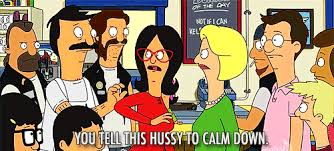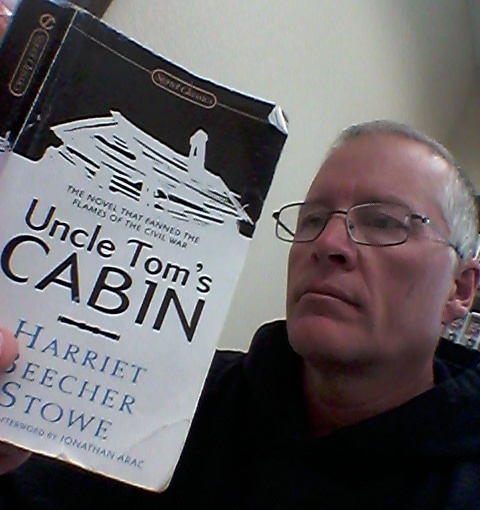By: David Schwier-9/20/2016
I first heard the term ‘Uncle Tom’ where I learned most of my childhood information–on a TV sitcom.
In particular: The Jeffersons.
Wheezy!

(See the ‘Uncle Tom’ clip here)
In high school and university, I studied the American South and slavery, and ‘Uncle Tom’s Cabin’ was mentioned often in lectures (and on the test), but I made it all the way through school without being required to read it.
Thank God.
Because if I had read it then, I don’t think I’d have the appreciation I have now, after having written several books myself.
Because of that, I can say with confidence that ‘Uncle Tom’s Cabin’ is beyond genius.
But I’m amazed, confused and saddened as to how and why ‘Uncle Tom’ has become a derogatory term used to describe people of shallow or ultra-subservient character.
The mythology surrounding the character Uncle Tom is that he was a good Christian who uncritically went along with the abuse of his oppressors to the point of being ‘brainwashed’ by his religion into not only accepting his station in life, but being quite content in it.
Thus, Uncle Tom means someone who has no spine who hides behind religion and/or fear, who by their inaction and compliance allow unjust systems to continue.
Nothing could be further from the truth of the Tom of Stowe’s novel.*
In fact, before we’re introduced to Tom in the novel, we meet a character named George.
George is a young, smart, talented slave who is not at all sympathetic to Christianity. In fact, George sees Christianity as a barrier to the end of slavery….just as critics of the religion continue to espouse to this day.
George is bitter about his plight and agitates openly in front of his family and friends for an end to slavery, often to the point of endangering himself before his white oppressors.
But (spoiler alert!) after a long road and tough circumstances, George and his wife escape to Canada. George has a change of heart, is convinced God helped in their deliverance, and eventually goes on to live in Africa.
Now….the genius of Stowe’s novel is that her characters are incredibly complex, just as people are complex in real life.
And just like in real life, Stowe herself (being a white Christian) complacently went along for years and years thinking slavery was evil, but not evil enough to get out of her comfort zone to do anything about it….
Until the Fugitive Slave Act of 1850 (here) came to her own backyard.
It was finally time to get off her duff and take action….

Two years later, ‘Uncle Tom’s Cabin’ was published.
So who then, is Uncle Tom?
Tom is an illiterate older slave in the service of a kind and fair owner in Kentucky named Mr. Shelby…and yes, Tom is a very devout Christian.
He’s affectionately called ‘Uncle’ by Mr. Shelby’s son who loves Tom and spends copious amounts of time with him and his family in their slave shack.
So the story opens with Mr. Shelby needing to sell Tom in order to cover increasing debts.
But Shelby is conflicted about having to sell Tom away. Away from Tom’s own family as well as the Shelby family who’ve grown to love him.
But Tom accepts the bad news with all the grace he can muster and is sold down South to a fair and morally conflicted slave-owner named St. Clare.
Tom quickly becomes a source of light and redemption as he tries to help St. Clare defeat the demons of alcoholism and despair.
And St. Claire, in turn having great love and respect for Tom, agrees in writing to secure Tom’s freedom.
But one night the owner is fatally stabbed outside a tavern and his less-than-sympathetic wife tears up the contract.
Tom is then sold to the evil and abusive Simon Legree.
On the plantation, two female slaves of Simon’s eventually hatch a plot to escape, and Tom witnesses them leaving.
Legree has Tom beaten until he gives up what he might know, and though Tom admits he saw everything, he refuses to give Legree any information and is beaten to death.

So actually, Tom is a hero of mythic proportions for his actions and sacrifice, especially in his protection of the slave women.
And with respect to the Uncle Tom character being subservient and non-resistant in the face of oppression, I think that’s the most incredibly ignorant way to understand his situation.
The South in the time of slavery was an all-encompassing highly-refined machine of evil and oppression.
From top to bottom.
The fear and hopelessness it instilled on generations of African-Americans was immense, intense, complete and total, and continues to be problematic to this day.
There’s no way for anyone who hadn’t lived it to fully understand it. And judgments from those outside, especially outside the race–and especially from White America–only exposes the heights of ignorance and stupidity toward the situation.
Sometimes, oftentimes, for the majority of those under oppressive systems, it seems there is simply no way out. Resistance, any resistance at all (even a mis-timed sideways glance) could mean certain death.
So…..on the contrary:
In the book, Tom was not embracing a God-ordained shelter of agreement and compliance with an oppressive system while ignorantly looking toward the promise of eternal life after death.
No.
Tom was embracing the promise of God that those who are in bondage in unjust systems will one day live in wide-open spaces of freedom as they see all wrongs righted, whether in this life or the next. (For an amazing discussion of this, see here)
Making things more complicated, though Tom was caught in an evil system, he was treated fairly and kindly by his owners most of his life.
Yes, it was a horribly oppressive system overall, but Tom’s choice to live and work and enjoy the promises of his God as opposed to the risk of certain death if he resisted didn’t make much sense in that situation.
Until Simon Legree.
And then Tom didn’t live long enough to have the choice of modifying his stance even if he wanted to.
Now…..Stowe has said her characters and events in the book were amalgamations of people from real life.
And it’s clear after having read the book that Stowe took the real-life person of Josiah Henson and split him into two different characters–Tom and George. (Learn about Henson here)
This was done to allow different paths of her plot to cover more ground in terms of the experience and attitudes of the widest range of people–white and black–in her study of the complexities and opinions of all sides of the slavery debate (contrary to her novel being an unthinking piece of Christian propaganda many claim it is).
So the characters of Tom and George are a bit more extreme in their fictionalized forms than the real-life Henson, who embodied each character in his one self.
That being said, however, given the actual character of Tom in the book—if you ever, ever, ever, hear someone derisively refer to someone else as ‘Uncle Tom,’ I’ll guarantee you they will be absolutely nothing like the Tom character embodied in the American genius classic ‘Uncle Tom’s Cabin.’
That I guarantee.

—————
*However, I can also see how the African-American community could be resentful of Stowe and her book thinking how sad it was that nothing changed until a white woman from the power-structure that was oppressing them gets damn-near sainted for merely expressing what they’d known all along and had been experiencing for years, but hadn’t got to express in writing because they weren’t allowed to go to school and (if that weren’t bad enough) no one in the white power-structure would’ve listened to them anyway because that was the very nature of the game.
So yes, this could be difficult and contentious indeed.
And yet, even today, the best way to gain ground in changing oppressive systems is to have the very power-structure itself call out its own injustices.
It’s called being a prophet.
And that’s exactly what Stowe accomplished with UTC.
—————-








